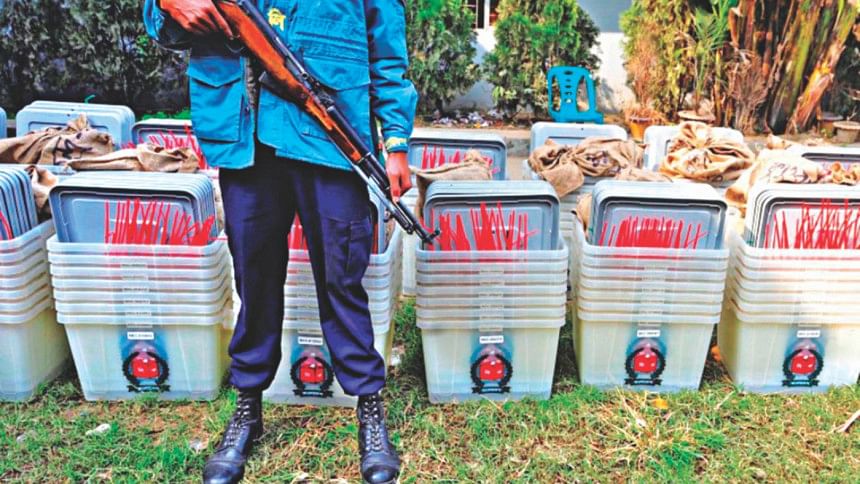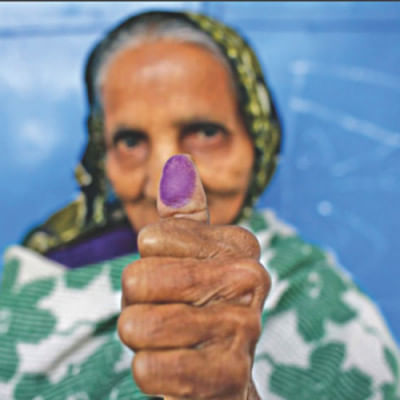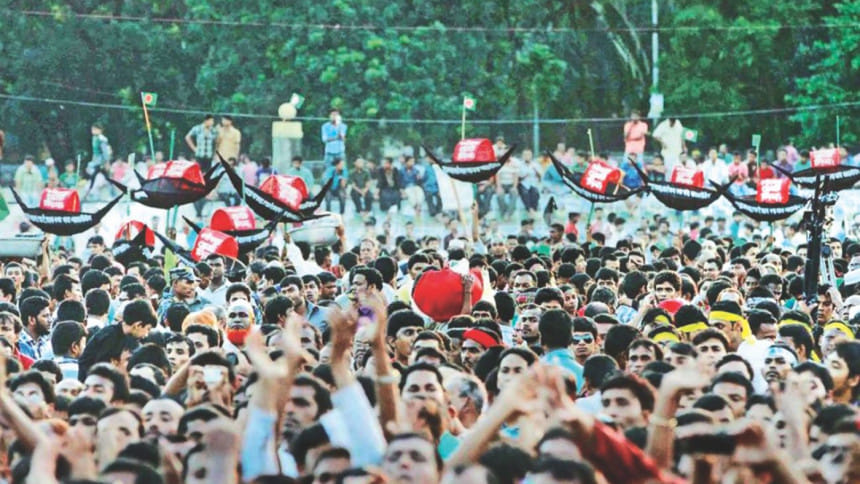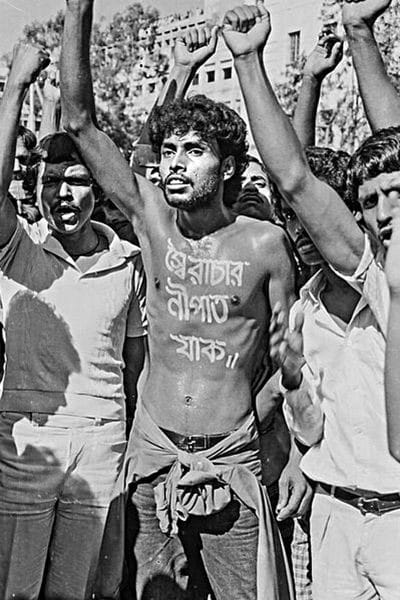Redemption Day

In the end, the votes alone will count. Or so we hope. And in around 48 hours from now, we'll know. For all that it is played up as an act of civic duty, it does offer a delicious chance at subversion, voting. Very soon after my own political awakening on December 6, 1990—that bewitching evening whose amber glow and delirious sounds I thank memory for retaining—on the campaign trail with my uncle (fuppa) as he ran in what I now understand to be the advent of democracy in Bangladesh, I learned about voters who were happy to accept money from either side in exchange for their vote, but later in the secrecy of the voting booth, put the seal down next to whichever candidate they pleased.
While one may have learnt of it in the context of treachery, neatly gliding over the original sin of buying votes or attempting to anyway, in time I came to regard it as absolutely the right thing to do. Good on them for realising their vote is really the one thing for which they are not beholden to anyone. From recent times, the result of the Brexit vote in the UK, essentially spoke to this subversive tendency in the electorate. Where the government, media, the polls, the experts, even the central bank and visiting dignitaries, all lined up on one side, pulling out every stop in the book. Only for voters to say thank you and go the other way, when the time came to have their say. Once you're behind that curtain in the polling centre, nothing but your own conscience can and will dictate your subsequent action. For most people, both these tend to be pretty difficult to pin down in themselves, let alone in others. And that only serves to make the integrity of the process all the more important. You can never second-guess the voter.

Yet even in the post-1991 era, Bangladeshis have been forced to endure two elections that fell abjectly short of resonating their will, their conscience. The principal way in which they fell short was the failure to attract the people's participation—without which any electoral exercise becomes pretty meaningless. Both dates have become immortalised in the country's political lore, destined to live on in infamy. They bear repeating, only to the extent that the first—February 15, 1996—was thankfully obliterated quickly enough. On December 30, the country now stands poised to finally put behind it the second—January 5, 2014.
Make no mistake, even for those who benefited (some exorbitantly so) from the farcical exercise that produced the 10th Jatiya Sangshad, the whole thing has hung like an albatross around the neck. Countless are the times that the ruling Awami League's stalwarts, all the way up to the Prime Minister herself, have been caught wishing it were different. Although evidently not enough to put it right. And so the sheer tribalism afflicting our politics means that the result not only stood, but also that the parliament it produced, described at one point by Dr Iftekharuzzaman of Transparency International's local chapter as a “puppet show”, has served out its full term.
It also means that the League has given itself the opportunity to correct the wrong on its own terms. One of the great things about elections is their redemptive power, and redemption for the ruling party in this case lay in organising an acceptable election, given that it took on the responsibility of its own accord in 2011. It did so through the exercise of its supermajority in parliament. Yet by convention, electoral rules and regulations are never subjected to the vagaries of majoritarian politics; they are arrived at through consensus among political parties. Having broken with that, it was up to them to at least do everything in their power to guard the integrity of the election process, starting with the enactment of a law regulating the appointment of election commissioners. As is well known, the constitution of Bangladesh neither prescribes a list of qualifications as pre-requisites for someone to be appointed as an election commissioner, including the chief, nor does it fix the number of election commissioners to be appointed.

What it does say, in Article 118 [1] is that “the appointment of the Chief Election Commissioner and other Election Commissioners (if any) shall, subject to the provisions of any law made in that behalf, be made by the President.” In line with the part emphasised in italics, the last Election Commission that commanded the nation's respect and admiration, the one led by the venerable Shamsul Huda (2007-12), submitted a draft law titled "Chief Election Commissioner and Election Commissioner (Appointment Procedure) Act" in 2011. Yet this was quickly shelved, and subsequently we have seen two more election commissions appointed that failed to meet the people's heightened expectations, particularly in view of the new paradigm whereby elections would be held under partisan governments. Together they have overseen a gradual erosion of the public's faith in the country's electoral mechanism, through a string of local and national elections that almost never failed to disappoint.
Roughly coinciding with this period, particularly since 2015, it has been notable how Bangladeshis have exhibited a great interest in elections abroad, from Canada to Bihar. Some of it may be attributed to globalisation, no doubt. Yet on each occasion, it was the yearning to have their own say at the polling booth again, like they did in 1991, in 1996 (second time around, in June), in 2001 and 2008—when turnout touched 80 percent—that shone through. By now, the desire to go and cast their vote in a meaningful election must be akin to a 10-year itch. And so there really should be no scope for a depressed turnout, except as a resounding rejection of the system. As things stand now, December 30, 2018 is a date for the people of Bangladesh to re-establish their dominion, over the nation they have wrought. For better or for worse.
To be sure, much remains uncertain. Grave concerns abound over the electoral mechanism's ability to fix itself, following the years of disrepair. As touched upon earlier, the present Election Commission has not exactly inspired confidence since taking office in February, 2017. The opposing parties, that have organised themselves into a slew of alliances, harbour grave doubts surrounding the intentions of the AL and its allies. It can be frustrating when your only way out of a predicament is to sign up for a game where the rules are set by someone else—that too someone you expressly distrust. The same distrust that has been the real poison eating away at the fabric of our politics for aeons now. The caretaker government provision was of course envisioned as a fix for that. The way things have played out, even as other nations with dysfunctional politics start picking up on the idea, it is on its way to being discarded as a relic in the country that gave birth to it. Yet still 'on its way' only I say, as opposed to being done away with completely, barring that one outstanding requirement: an election under a partisan government that the people can truly accept as free and fair.
That is the great challenge for the League in this election. And equally, its great opportunity. The challenge will fall to its baser elements, that any government that has ruled for 10 years must inevitably deal with. The opportunity though must be relished by the higher ideals it is so fond of extolling as part of its grand narrative, wherein it sees itself as the good shepherd, or perhaps more appropriate in their case, the rightful majhi at the nation's helm, steering the nation toward a bright future, that is ever-brighter still.

Over the last 10 years, it has painted that future by-and-large in the hue of development. It is true that under their stewardship, the country's economy has indeed scaled new heights, swelling from $102 billion in 2009 to over $250 billion today. Yet it is also true that the economy was registering strong growth in the years preceding the AL's decade-long run as well (touching 7.1 percent in 2007, all my figures relating to the economy are from the World Bank), so it is difficult to attribute sole ownership to them. Or say we couldn't have done it without them. In any case, a number of polls in recent years have reflected that the people value democracy and a sense of ownership over their own affairs far too much to be swayed by economics alone.
That sense of ownership has come under attack in recent years, quite literally in the hands of the emboldened Chhatra League, over whom the party central command's influence grows more tenuous with each year in power, and in other ways through the enactment of short-sighted, embarrassingly anarchic laws that are as poorly drafted as they are zealously abused. The civil service meanwhile, packed to the rafters with yes-men and opportunists, has long-stopped acting as a sounding board for their political masters.
That is why, whether or not the League know it yet, their greatest prize may actually lie in listening to the people. Central to the vision they have propagated is the insistence that the country and its people can be trusted to govern themselves, and do so fairly. In the language of political scientists, we must show ourselves to be capable of what is called 'peaceful transfer of power', of which elections are just a part, without the need for a caretaker government. Although even before a single ballot has been cast, a string of incidents since the announcement of the election schedule have already served to render the process questionable, come December 30th, it is the Awami League's opportunity to redeem itself.
Come December 30th, it is the Awami League's opportunity to redeem itself, by acting in accordance with the results of an election that is obviously transparent, somewhat festive if possible, but above all participatory—one that cannot help but reflect the people's will. Now that all the parties have signed up to appear on the ballot, a high turnout will be the most important factor in determining this. Otherwise the entire narrative breaks down and comes a cropper. Let us put faith in something better. See you at the polling centre!
Shayan S. Khan is executive editor of the Dhaka Courier.

 For all latest news, follow The Daily Star's Google News channel.
For all latest news, follow The Daily Star's Google News channel. 



Comments